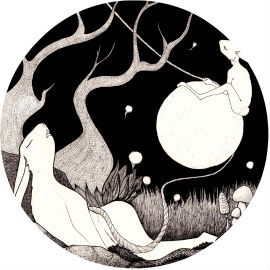
Illustration for ‘Das eigensinnige Kind’ (The Wilful Child), a tale collected by the Brothers Grimm. Illustrator Unknown.
And one more. This is a draft abstract for a paper I hope to deliver at the annual conference of the Australasian Association of Writing Programs (AAWP), in Melbourne this November. The conference title is: Writing the Ghost Train: Rewriting, Remaking, Rediscovering.
Abstract: Uchronic, or queer in no time: wilful subjects in historical fiction
Works of historical fiction by and about queer women have been characterised as largely ideological texts, concerned with inserting (imagined) queer stories and queer perspectives into the historical and/or literary landscape. These so-called ‘revisionist’ texts have persistently been read largely in terms of their relationship to both historical research and scholarship, and the genre of historical fiction.
In this paper, I explore the ways in which reading (and writing) these texts in the context of so-called Uchronia (a neologism combining the Green prefix ou-, meaning ‘no’ with the chronos/time: ‘in no time’), or alternative histories, provides a way of understanding such texts not in terms of interpreting or re-interpreting the past, but instead in creating narratives that exist ‘in no time’.
Such works can, in this way, be read not as predominantly in conversation with the past, but in conversation with a range of temporalities including but not limited to the past, the present, and the future.
The paper also explores the wilful nature of such writing, drawing on Sara Ahmed’s Wilful Subjects (2014), and explores the ways in which queer uchronic writing is both an enactment of wilfulness on the part of the writer, and a narrative embodiment of wilfully queer characters.
Finally, the paper explores the ethical consequences of wilfully writing ‘in no time’, through an exploration of key works by Sarah Waters and Jeanette Winterson, as well as through an examination of my own Uchronic works and storytelling practices.
References
Ahmed, Sara 2014 Wilful Subjects, Durham, North Carolina, Duke University Press.
Bilger, Audrey n.d. ‘Jeanette Winterson, The Art of Fiction No. 150’ The Paris Review n.d., viewed 10 May 2015, < http://www.theparisreview.org/interviews/1188/the-art-of-fiction-no-150-jeanette-winterson>.
Ransom, Amy J 2003 ‘Alternate History and Uchronia: Some Questions of Terminology and Genre’ Foundation: The International Review of Science Fiction, vol. 32, issue 87, pp. 58-72.
Serchay, David S 2001 ‘Uchronia’ Library Journal, vol. 126, issue 1, p. 34.
Sulway, Nike 2013 Rupetta, Leyburn, North Yorkshire, Tartarus Press.
Waters, Sarah 1998 Tipping the Velvet, London, Virago Press.
Waters, Sarah 2014 The Paying Guests, London, Virago Press.
Winterson, Jeanette 1987, The Passion, London, Vintage.
Winterson, Jeanette 1989, Sexing the Cherry, London, Bloomsbury Press.
Winterson, Jeanette 1995, Art Objects: Essays in Ecstasy and Effrontery, London, Vintage.

No Comments